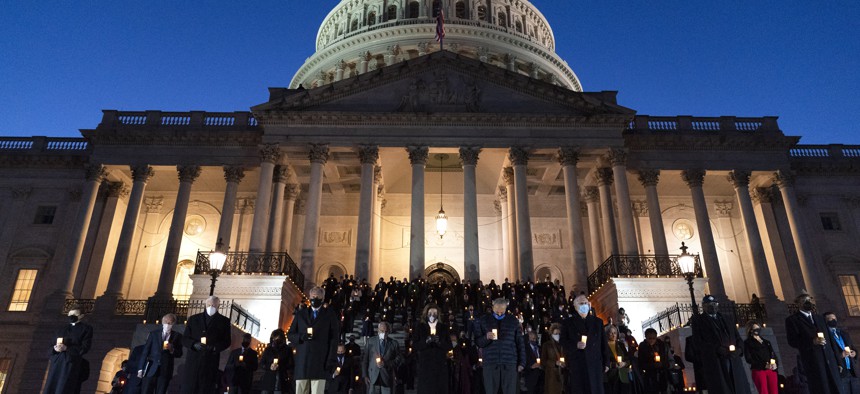Senate Covid Bill Adds Restrictions on State and Local Aid

Members of Congress hold a moment of silence for 500,000 U.S. COVID-19 deaths, Tuesday, Feb. 23, 2021, on the east front steps of the Capitol in Washington. AP Photo/Jacquelyn Martin

Connecting state and local government leaders
The legislation would impose requirements on how states can use the money, and also redirect $10 billion that had been bound for cities and counties.
The Senate has begun what is expected to be a lengthy debate on a $1.9 trillion coronavirus relief bill that puts new restrictions on direct aid to state and local governments.
The 628-page bill, introduced Thursday, includes numerous changes from the House version passed last week, which allocated $350 billion to state, local, tribal and territorial governments.
The Senate bill would keep almost the same levels of funding—sending $195 billion in direct aid to states, and $120 billion to cities and counties. The bill redirects $10 billion that had been designated for cities and counties to establish a “critical capital projects fund” that would help states pay for projects that enable work, education and health monitoring programs in response to the pandemic.
States would each still get at least $500 million, with additional funding allocated based on their unemployment levels.
But the Senate bill would also require states to use the money for certain purposes. These eligible expenses include: Responding to the pandemic with aid to households, small businesses or impacted industries; funding government services that were cut due to declines in revenue brought on by the pandemic; or making “necessary investments” in water, sewer or broadband infrastructure.
States would be explicitly barred from putting the money toward pension funds or simply using it to prevent tax increases.
Even though cities and counties would each receive slightly less direct aid money in the Senate bill, local government associations affirmed their support for it.
“Counties have struggled throughout the pandemic to marshal enough resources to serve our residents, support our frontline heroes and rebuild our communities,” said Matthew Chase, executive director of the National Association of Counties. “We urge our federal partners to stand with us and deliver direct relief.”
Likewise, the U.S. Conference of Mayors said the Senate plan would provide much needed relief to cities.
“This bill is critical to being able to turn the page and move us forward, and we urge the Senate and House to move quickly to send it to the president’s desk,” said Louisville Mayor Greg Fischer, the president of the conference.
The Senate kicked off debate over the proposal Thursday with Vice President Kamala Harris called upon to break a 50-50 tie in order to move the bill forward. It could be days before a final vote on the relief package takes place, amid Republican opposition to it. GOP Sen. Ron Johnson, of Wisconsin, is forcing clerks to read the entire relief bill aloud on the Senate floor, a process that could take up to 10 hours and could delay a vote on the legislation until over the weekend.
Senate Majority Leader Chuck Schumer said Democrats were “delighted” that Johnson wanted to ensure that people have a chance to hear what is in the bill.
“If the senator from Wisconsin wants to read it, let everybody listen because it has overwhelming support,” Schumer said.
Aside from state and local aid, the Senate bill deviates from the House legislation in other ways.
While the bill retains $1,400 direct stimulus payments to individual Americans making up to $75,000 a year, it reduces the income level at which checks are phased out down to $80,000 from $100,000.
The bill also does not include a $15 minimum wage provision, as was included in the House bill.
The Senate version still includes a $400-a-week federal benefit to unemployed workers in addition to any state payments and it extends those payments through the end of August.
Andrea Noble is a staff correspondent with Route Fifty.

NEXT STORY: State Lawmakers Split Over Need for Federal Aid




